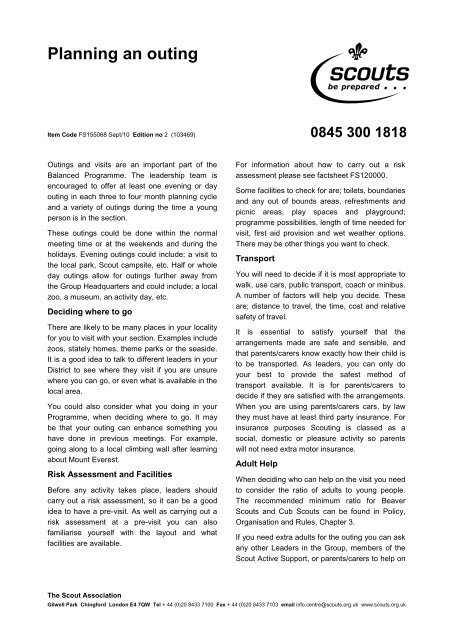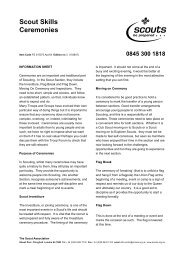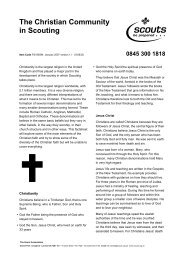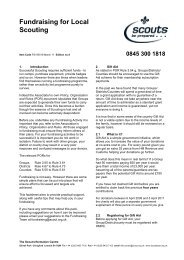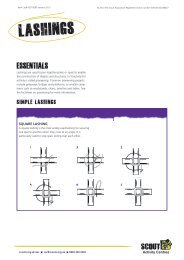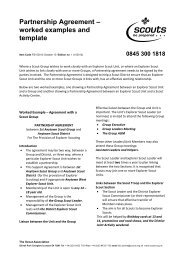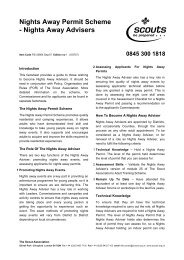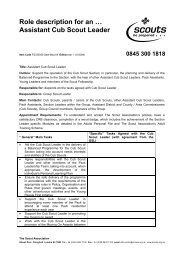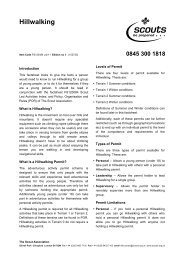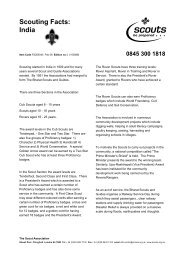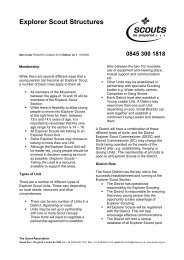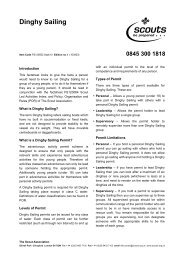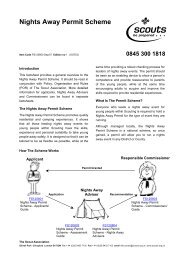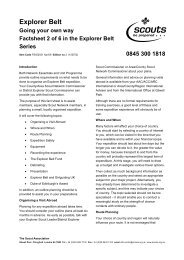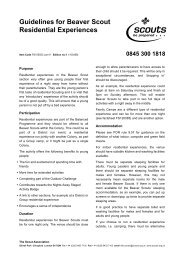Planning an outing - ScoutBase UK
Planning an outing - ScoutBase UK
Planning an outing - ScoutBase UK
You also want an ePaper? Increase the reach of your titles
YUMPU automatically turns print PDFs into web optimized ePapers that Google loves.
<strong>Pl<strong>an</strong>ning</strong> <strong>an</strong> <strong>outing</strong><br />
S<br />
Item Code FS155068 Sept/10 Edition no 2 (103469) 0845 300 1818<br />
Outings <strong>an</strong>d visits are <strong>an</strong> import<strong>an</strong>t part of the<br />
Bal<strong>an</strong>ced Programme. The leadership team is<br />
encouraged to offer at least one evening or day<br />
<strong>outing</strong> in each three to four month pl<strong>an</strong>ning cycle<br />
<strong>an</strong>d a variety of <strong>outing</strong>s during the time a young<br />
person is in the section.<br />
These <strong>outing</strong>s could be done within the normal<br />
meeting time or at the weekends <strong>an</strong>d during the<br />
holidays. Evening <strong>outing</strong>s could include; a visit to<br />
the local park, Scout campsite, etc. Half or whole<br />
day <strong>outing</strong>s allow for <strong>outing</strong>s further away from<br />
the Group Headquarters <strong>an</strong>d could include; a local<br />
zoo, a museum, <strong>an</strong> activity day, etc.<br />
Deciding where to go<br />
There are likely to be m<strong>an</strong>y places in your locality<br />
for you to visit with your section. Examples include<br />
zoos, stately homes, theme parks or the seaside.<br />
It is a good idea to talk to different leaders in your<br />
District to see where they visit if you are unsure<br />
where you c<strong>an</strong> go, or even what is available in the<br />
local area.<br />
You could also consider what you doing in your<br />
Programme, when deciding where to go. It may<br />
be that your <strong>outing</strong> c<strong>an</strong> enh<strong>an</strong>ce something you<br />
have done in previous meetings. For example,<br />
going along to a local climbing wall after learning<br />
about Mount Everest.<br />
Risk Assessment <strong>an</strong>d Facilities<br />
Before <strong>an</strong>y activity takes place, leaders should<br />
carry out a risk assessment, so it c<strong>an</strong> be a good<br />
idea to have a pre-visit. As well as carrying out a<br />
risk assessment at a pre-visit you c<strong>an</strong> also<br />
familiarise yourself with the layout <strong>an</strong>d what<br />
facilities are available.<br />
For information about how to carry out a risk<br />
assessment please see factsheet FS120000.<br />
Some facilities to check for are; toilets, boundaries<br />
<strong>an</strong>d <strong>an</strong>y out of bounds areas, refreshments <strong>an</strong>d<br />
picnic areas, play spaces <strong>an</strong>d playground;<br />
programme possibilities, length of time needed for<br />
visit, first aid provision <strong>an</strong>d wet weather options.<br />
There may be other things you w<strong>an</strong>t to check.<br />
Tr<strong>an</strong>sport<br />
You will need to decide if it is most appropriate to<br />
walk, use cars, public tr<strong>an</strong>sport, coach or minibus.<br />
A number of factors will help you decide. These<br />
are; dist<strong>an</strong>ce to travel, the time, cost <strong>an</strong>d relative<br />
safety of travel.<br />
It is essential to satisfy yourself that the<br />
arr<strong>an</strong>gements made are safe <strong>an</strong>d sensible, <strong>an</strong>d<br />
that parents/carers know exactly how their child is<br />
to be tr<strong>an</strong>sported. As leaders, you c<strong>an</strong> only do<br />
your best to provide the safest method of<br />
tr<strong>an</strong>sport available. It is for parents/carers to<br />
decide if they are satisfied with the arr<strong>an</strong>gements.<br />
When you are using parents/carers cars, by law<br />
they must have at least third party insur<strong>an</strong>ce. For<br />
insur<strong>an</strong>ce purposes Sc<strong>outing</strong> is classed as a<br />
social, domestic or pleasure activity so parents<br />
will not need extra motor insur<strong>an</strong>ce.<br />
Adult Help<br />
When deciding who c<strong>an</strong> help on the visit you need<br />
to consider the ratio of adults to young people.<br />
The recommended minimum ratio for Beaver<br />
Scouts <strong>an</strong>d Cub Scouts c<strong>an</strong> be found in Policy,<br />
Org<strong>an</strong>isation <strong>an</strong>d Rules, Chapter 3.<br />
If you need extra adults for the <strong>outing</strong> you c<strong>an</strong> ask<br />
<strong>an</strong>y other Leaders in the Group, members of the<br />
Scout Active Support, or parents/carers to help on<br />
The Scout Association<br />
Gilwell Park Chingford London E4 7QW Tel + 44 (0)20 8433 7100 Fax + 44 (0)20 8433 7103 email info.centre@scouts.org.uk www.scouts.org.uk
page 2 of 3<br />
the visit. Whoever you use, it is recommended<br />
that the young people know who is attending.<br />
Please refer to POR rule 3.26 to see who must<br />
have a personal enquiry carried out on them<br />
through the Scout Association. If you have adults<br />
who are helping <strong>an</strong>d need a personal enquire<br />
check completed through the Scout Association,<br />
you will need to allow at least 8 weeks to be sure<br />
of getting the check back in time. More<br />
information on the process c<strong>an</strong> be obtained from<br />
the Scout Information Centre.<br />
Insur<strong>an</strong>ce<br />
A personal accident <strong>an</strong>d medical expenses<br />
insur<strong>an</strong>ce policy is provided by the Association<br />
through Unity Scout Insur<strong>an</strong>ce Services – to cover<br />
all Members as recorded on the Annual Census<br />
Return, together with new Members joining during<br />
the year. This is not however intended to be <strong>an</strong><br />
income replacement policy; it provides a defined<br />
level of benefit for Members in the event of <strong>an</strong><br />
accident that results in absence from work. Details<br />
c<strong>an</strong> be obtained from Unity on the contact details<br />
below or their website. Non-members such as<br />
parents/carers, supporters <strong>an</strong>d other children are<br />
not provided with the same automatic basic cover,<br />
although this c<strong>an</strong> be arr<strong>an</strong>ged through Unity also.<br />
It is wise to consult with your Group Scout Leader<br />
to consider exp<strong>an</strong>ding cover by supplementary<br />
insur<strong>an</strong>ce.. Unity Insur<strong>an</strong>ce Services (Scout<br />
Insur<strong>an</strong>ce) is a subsidiary of the Scout<br />
Association <strong>an</strong>d provides bespoke insur<strong>an</strong>ce<br />
policies for Scouts & Guides to cover almost <strong>an</strong>y<br />
activity or individuals including Property &<br />
Equipment, <strong>UK</strong> <strong>an</strong>d Over Sea’s Travel, Minibus,<br />
Marine, Trailer, Campsite Liability <strong>an</strong>d more.<br />
All of Unity’s profits are donated back to Sc<strong>outing</strong><br />
Unity Insur<strong>an</strong>ce Services<br />
Marlborough Road<br />
L<strong>an</strong>cing Business Park<br />
L<strong>an</strong>cing<br />
West Sussex<br />
BN15 8UG<br />
Tel: 0845 0945 703<br />
Fax: 01903 751044<br />
E mail: scouts@unityins.co.uk<br />
Web: www.scoutinsur<strong>an</strong>ce.co.uk<br />
In addition, Unity have arr<strong>an</strong>ged the Scout<br />
Association’s umbrella legal liability insur<strong>an</strong>ce<br />
policy which provides cover for Commissioners,<br />
Scouters <strong>an</strong>d other persons authorised to be in<br />
charge of, or assist with, Scout activities. This is<br />
for claims made by Members under their control,<br />
or their parents/carers, or by third parties alleging<br />
legal liability arising out of Loss, Injury or Damage,<br />
occurring during <strong>an</strong>y authorised Scout activity.<br />
The policy does not automatically cover legal<br />
liability arising out of ownership or operation of<br />
motor vehicles.<br />
Cost<br />
Usually <strong>outing</strong>s will be self-fin<strong>an</strong>cing so it is<br />
import<strong>an</strong>t to calculate the likely costs accurately.<br />
Costs will include tr<strong>an</strong>sport, entr<strong>an</strong>ce fees,<br />
refreshments, <strong>an</strong>y equipment required <strong>an</strong>d <strong>an</strong>y<br />
activities booked.<br />
Some places that you could visit may be able to<br />
give you a discount if you have a large number<br />
going on the trip.<br />
There may be some members of the section<br />
whose parents could have problems paying for<br />
the <strong>outing</strong>. If this is the case, the Group Executive<br />
Committee may agree to pay for that young<br />
person or come to some other agreement.<br />
Who to inform<br />
Your Group Scout Leader, <strong>an</strong>d through them the<br />
District Commissioner, should be fully informed<br />
about the pl<strong>an</strong>s for <strong>an</strong>y <strong>outing</strong>.<br />
Parents/carers should be left in no doubt as to<br />
what activities are pl<strong>an</strong>ned <strong>an</strong>d what<br />
arr<strong>an</strong>gements have been made. The Scout<br />
Association produces a form which c<strong>an</strong> be used to<br />
send parents the necessary details. This is the<br />
Activity Information Form (FS120081) which is<br />
available from the Scout Information Centre.<br />
Information to include on the form should include:<br />
• Date of the proposed <strong>outing</strong><br />
• Venue<br />
• Pl<strong>an</strong>ned activities<br />
• Cost<br />
• Payment method
page 3 of 3<br />
• Departure time <strong>an</strong>d place<br />
• Return time <strong>an</strong>d place<br />
• Whether pocket money is required <strong>an</strong>d how much<br />
is allowed<br />
• If food <strong>an</strong>d drink required<br />
• Clothing required, uniform, waterproofs, footwear<br />
etc<br />
• If the parents/carers are invited<br />
Information on the return slip from parents/carers<br />
should include:<br />
• Any medical treatment being received currently<br />
• Any disability or medical condition which might<br />
affect their child’s involvement<br />
• Parents/carers contact number during the <strong>outing</strong><br />
InTouch<br />
Whenever <strong>an</strong>y activity or event is run within<br />
Sc<strong>outing</strong> it is a requirement that <strong>an</strong> InTouch<br />
system is in place (POR 9.3). This is to ensure;<br />
everyone involved is aware of how communication<br />
will take place between Leaders, particip<strong>an</strong>ts <strong>an</strong>d<br />
those not on the event, there are details of who is<br />
present should <strong>an</strong>ything go wrong, <strong>an</strong>d there is a<br />
system in place in the event of <strong>an</strong> emergency.<br />
More information c<strong>an</strong> be found on the InTouch<br />
factsheet FS120075<br />
On the day of the <strong>outing</strong><br />
You will need to make sure you have with you:<br />
• First aid kit. For details of what to include in a first<br />
aid kit please see factsheet FS140048<br />
• Sick bags for the journey<br />
• Money, tickets <strong>an</strong>d details of the venue<br />
• A list of all the young people <strong>an</strong>d adults attending<br />
Headcounts<br />
During the <strong>outing</strong> or activity, remember to perform<br />
regular headcounts of the young people in your<br />
care. A headcount is <strong>an</strong> effective method of<br />
ensuring the group is together <strong>an</strong>d complete.<br />
adventurous activities. A headcount should be<br />
conducted where there is a ch<strong>an</strong>ge in<br />
environment during the activity, examples include:<br />
When ch<strong>an</strong>ging direction on a walk, perhaps to a<br />
new path, ensure the group is together <strong>an</strong>d<br />
complete.<br />
In <strong>an</strong> urb<strong>an</strong> environment, conducting a headcount<br />
both before <strong>an</strong>d after crossing a busy road will<br />
ensure the group remains together.<br />
You will need to find the way that works best for<br />
your section to conduct the headcount. Examples<br />
of how you c<strong>an</strong> do this could be:<br />
• To make sure each young person has a buddy,<br />
they keep <strong>an</strong> eye out for their buddy <strong>an</strong>d if they<br />
c<strong>an</strong>’t see them alert one of the adults. The<br />
buddies c<strong>an</strong> be paired up when a headcount is<br />
done.<br />
• Ask the young people to form into their<br />
lodges/sixes/patrols <strong>an</strong>d conduct the headcount<br />
from this, you c<strong>an</strong> involve the young people in the<br />
process.<br />
• Get the section into group sizes that are easily<br />
divisible for example if you have a group of 20, get<br />
the young people into smaller groups of five.<br />
After the <strong>outing</strong><br />
The Leader of the <strong>outing</strong> should ensure that:<br />
• Outst<strong>an</strong>ding bills are paid<br />
• A visit account is prepared for the Group<br />
Treasurer<br />
• Notes are kept of the arr<strong>an</strong>gements for future<br />
reference<br />
After the <strong>outing</strong>, your Assist<strong>an</strong>t District<br />
Commissioner may be interested to know how it<br />
went <strong>an</strong>d other leaders may be interested,<br />
particularly if it is a new venue.<br />
Conducting headcounts are equally import<strong>an</strong>t on<br />
everyday Sc<strong>outing</strong> activities as they are on more


